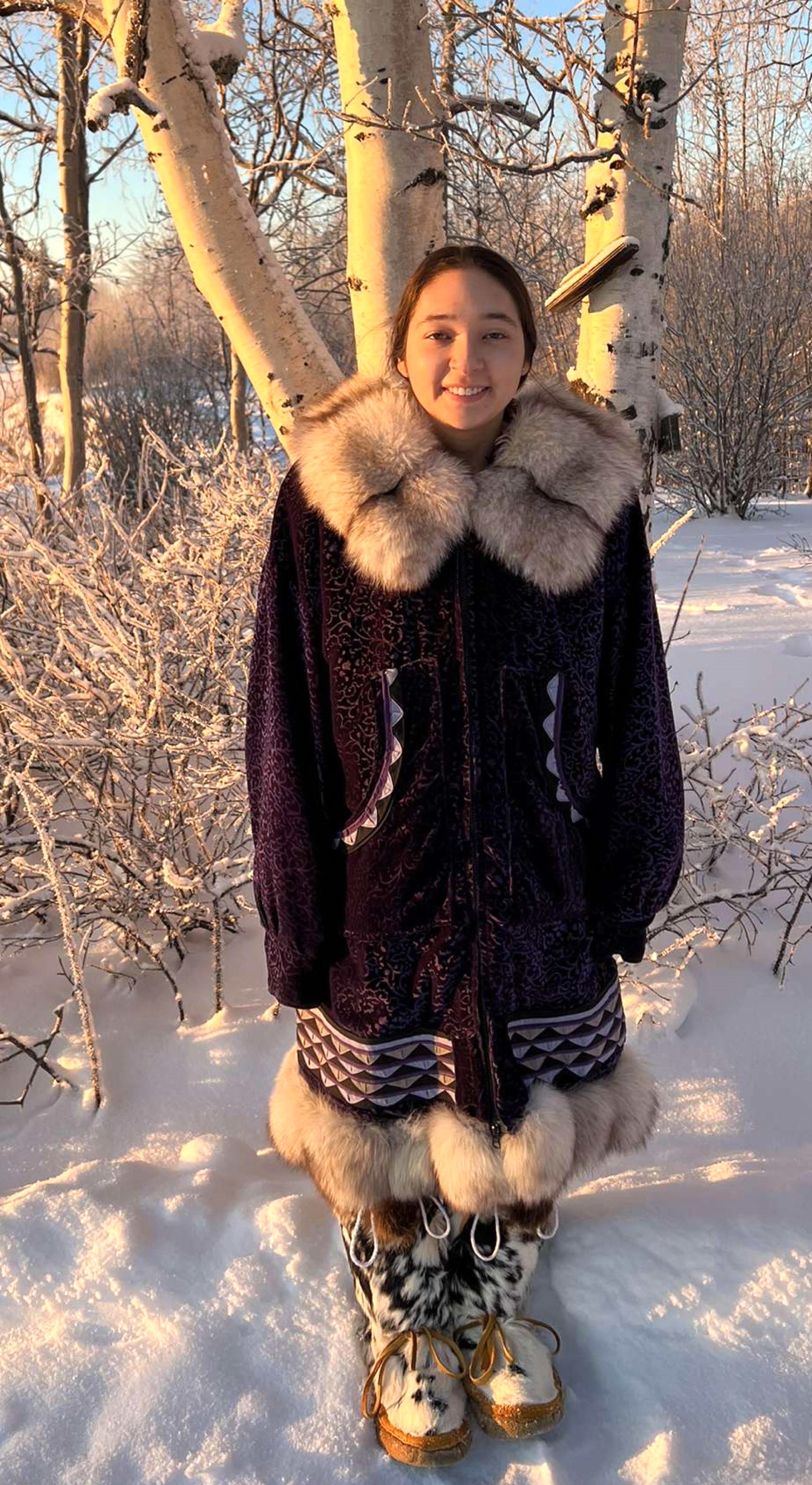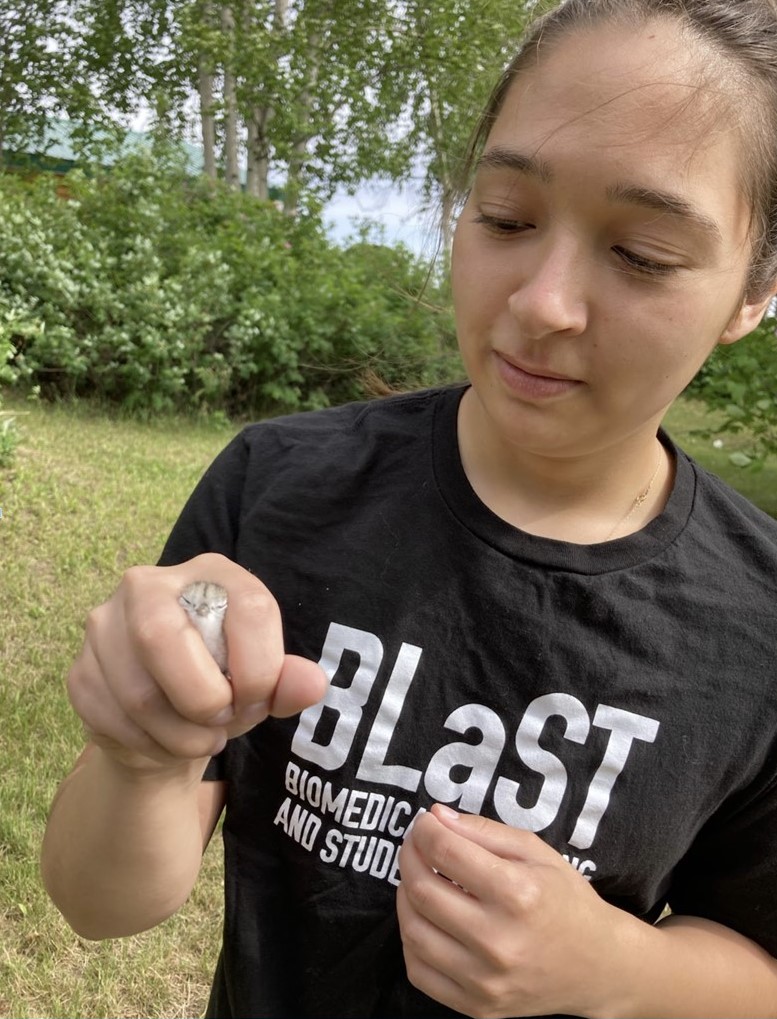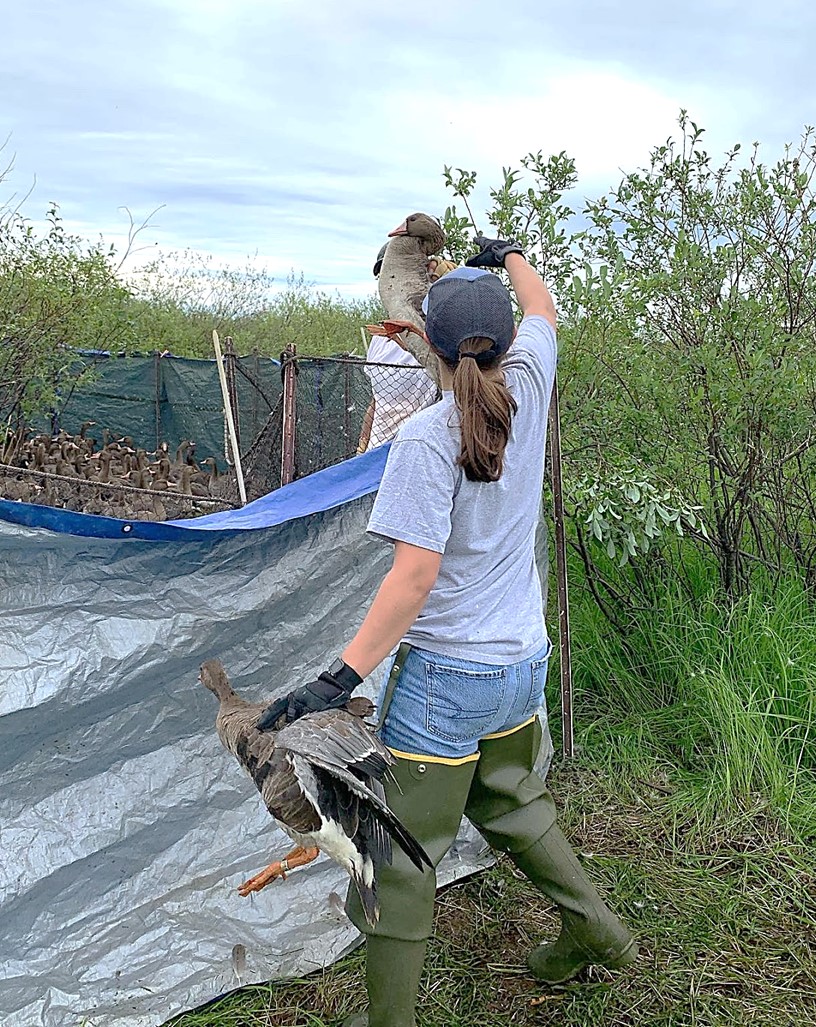BLaST celebrates January 2023 Scientist of the Month

BLaST Scholar Tirzah Bryant in her traditional parka and kkakene (Koyukon word for fur boots) in Galena, Alaska. (Photo credit P. Green, 2022)
Since 2016, the Biomedical Learning and Student Training (BLaST) program at UAF has highlighted scientists from all biomedical fields through its Scientist of the Month articles. BLaST Scholar and UAF wildlife biology undergraduate student Tirzah Bryant was selected as the January 2023 BLaST Scientist of the Month.
Tirzah Bryant graduated in December 2022 with a BS in Wildlife Biology. She was also a third-year BLaST Scholar, and her family is Athabascan from Galena, Alaska. She plans to pursue a master’s degree in Wildlife Biology at UAF studying the Galena Mountain Caribou Herd near her hometown of Galena.

BLaST Scholar and UAF wildlife biology undergraduate student Tirzah Bryant, pictured holding a Yellowlegs chick, was selected as the January 2023 BLaST Scientist of the Month.
Tirzah Bryant’s research focuses on subsistence food sources in interior Alaska with snowshoe hares. Bryant shared, “Researching snowshoe hares with my faculty mentor Knut Kielland taught me how to use peer-reviewed literature to build my knowledge, analyze data through photo datasets, utilize Rstudio (a free and open-source tool for data science and enterprise-ready professional software), and take what I have learned and apply it to my research. This has given me the confidence to ask my own research questions. I hope to better understand the movements and interactions between the wildlife like snowshoe hares and caribou that inhabit the areas where I grew up in Galena and on the Yukon River. I would like to encourage kids from Galena (and other villages in Alaska) to pursue a career in science by sharing my work. My research will allow us to better understand the subsistence resources we have been living alongside for generations so that we can continue to do so for many more.”
Bryant also worked as a biological science technician for the U.S. Fish and Wildlife Service’s Koyukuk/Nowitna/Innoko Wildlife Refuge during the summers of 2020-2022, where she worked in partnership with their migratory bird program. She assisted biologists to band migratory birds with the guidance of Supervisory Wildlife Biologist Julian Fischer and Galena Deputy Refuge Manager David Zabriskie.

Bryant working as a biology technician for the U.S. Fish and Wildlife Service, banding Greater White Fronted Geese in the Innoko Refuge.
Bryant shared, “I am grateful that I was mentored by Knut Kielland, a professor at the Institute of Arctic Biology. He taught me how to start with an interest area, narrow it down to a research question that leads to an organized research project. He gave me the guidance and the patience needed to develop this project myself. He was also very understanding and flexible with my busy college schedule, a mentor attribute I valued. He stressed that while my research was important, I needed to keep my education my number one priority. Because of BLaST, I connected with a research mentor who is helping me achieve my future educational and career goals.”
Bryant also thanked her BLaST Research, Advising and Mentoring Professionals Andrew Cyr and Emily Sousa, who were also “huge supporters of my research interests and were always there for me to help me get through my classes as well as any research challenges.” These BLaST Scientist of the Month articles are shared across all UAF and University of Alaska Southeast rural campuses and with BLaST’s partners Iļisaġvik College, Fort Lewis College, Diné College, Salish Kootenai College and Alaska Pacific University. For more BLaST Scientist of the Month highlights, visit their website.
The Biomedical Learning and Student Training (BLaST) program is a NIH-funded UAF program that enhances capacity for undergraduate biomedical research training and efficacy for engaging students from diverse, especially rural Alaskan, backgrounds in education and training for biomedical research careers. BLaST started in 2014 and continues to provide research opportunities for faculty, staff and students through its many workshops, curriculum, and research support and is in its second five-year phase II program.
Any questions about this article or any BLaST publications, please contact Amy Topkok.


